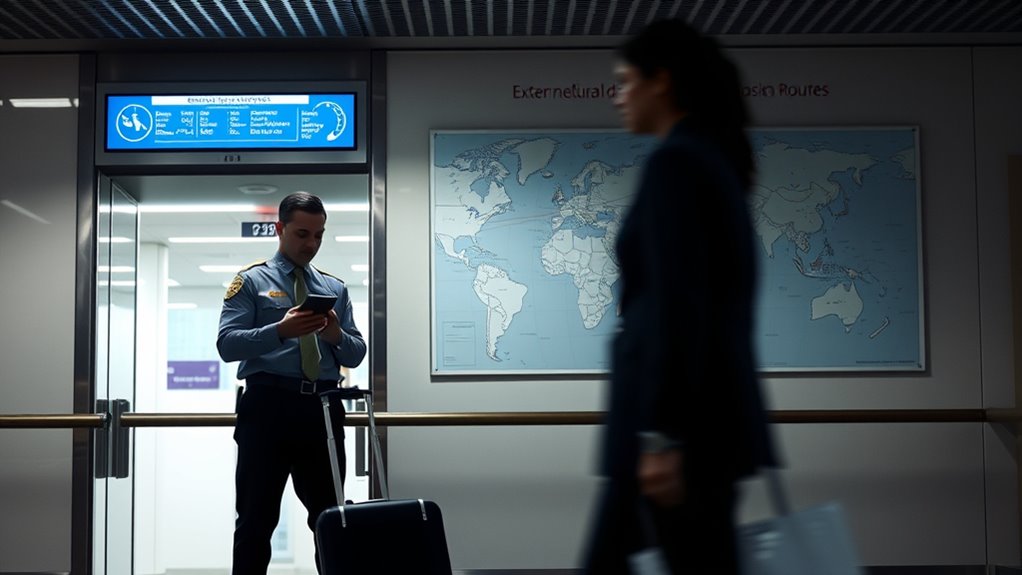When an international arrest warrant is issued, the country requesting extradition submits a formal request with evidence, which the judicial system reviews for fairness and compliance with treaties. You can challenge the decision, especially if there are concerns about unfair treatment or human rights issues. Countries aim to balance justice with sovereignty and protections, following legal procedures designed for transparency. If you’re curious about how these complex processes work, there’s more to uncover below.
Key Takeaways
- Extradition is initiated through a formal request with detailed evidence, based on international treaties.
- Judicial authorities review the request to ensure compliance with legal standards and treaty provisions.
- The person subject to extradition can challenge the decision in court, citing rights or procedural issues.
- Diplomatic considerations, such as protections against unfair treatment or the death penalty, influence approval.
- Proper legal procedures ensure transparency, fairness, and respect for human rights throughout the extradition process.

Have you ever wondered how a criminal in one country can be brought to justice in another? It’s a complex process that involves more than just capturing the suspect; it requires a formal legal framework to guarantee everything is done properly. That’s where extradition treaties come into play. These treaties are agreements between countries that specify the conditions under which one nation will surrender a person to another for prosecution or punishment. Without these treaties, extradition could become a tangled web of legal disputes and diplomatic conflicts. They help set clear rules, such as the types of crimes covered, the evidence required, and the protections available to the suspect.
Understanding how the legal process works is key. When law enforcement in one country believes a suspect has committed a crime and needs to be extradited, they usually initiate a formal request to the country where the individual is located. This request must include detailed evidence and documentation to justify the extradition. Once received, the legal process begins, often involving judicial review to assess whether the request complies with the terms of the extradition treaty. Courts examine factors like whether the crime is covered by the treaty, if the evidence is sufficient, and whether the individual’s rights will be protected. Additionally, the legal standards established by international agreements help ensure consistency and fairness in the process.
During this process, the person facing extradition has the right to challenge the decision in court. They might argue that the extradition request is politically motivated, that they face the risk of unfair treatment, or that the crime doesn’t meet the treaty’s criteria. The judge then makes a decision based on the evidence and legal standards. If approved, the individual is handed over to authorities from the requesting country. If denied, they can sometimes appeal or seek other legal remedies.
Throughout this entire process, diplomatic considerations often come into play. Countries are cautious about extraditing their citizens or residents to face potential unfair treatment or the death penalty. That’s why treaties often include protections and exceptions. Still, the core of the process remains rooted in the legal procedures established by the treaties and national laws. Extradition isn’t just about arresting a suspect; it’s about following a carefully prescribed legal process that balances justice, sovereignty, and human rights. This ensures that when a person is extradited, it’s done fairly, transparently, and within the bounds of international law.
Frequently Asked Questions
Can Extradition Be Refused for Political Crimes?
You might wonder if extradition can be refused for political crimes. Generally, countries refuse extradition if the crime is political, especially if it involves political asylum or diplomatic immunity. They see such cases as attempts to persecute individuals for their political beliefs. However, each country’s laws vary, and some might still extradite, depending on treaties and circumstances. So, political crimes often face hurdles in extradition, but it’s not always guaranteed.
How Long Does the Extradition Process Typically Take?
Imagine you’re wanted for a crime in another country, and the extradition process begins. The time frame varies depending on procedural steps like legal reviews, diplomatic negotiations, and possible appeals. Typically, it can take anywhere from a few months to over a year. For example, in a hypothetical case, delays occur if the requested country raises legal challenges or political issues, highlighting how complex and unpredictable the process can be.
Are Extradition Treaties Universal or Country-Specific?
You might wonder if extradition treaties are universal or country-specific. They’re actually country-specific, meaning each nation sets its own terms through extradition negotiations. These treaties define how treaty enforcement works, including which crimes qualify and the procedures involved. Because of this, enforcement varies widely, and countries often have different conditions for extradition. Understanding these treaties helps clarify how international cooperation in criminal cases operates across borders.
What Legal Protections Does a Fugitive Have During Extradition?
You might think fugitives have no legal protections during extradition, but that’s not true. Extradition safeguards are in place to protect your legal rights, including the right to challenge the extradition in court and ensure due process. These safeguards prevent wrongful or arbitrary surrender, allowing you to argue against extradition based on human rights issues or legal errors. Your legal protections aim to guarantee fairness throughout the process.
How Does International Law Influence Extradition Decisions?
International law plays a key role in extradition decisions by setting extradition standards that countries follow, ensuring consistency and fairness. It also addresses enforceability challenges, helping to resolve conflicts between different legal systems. When you’re involved in an extradition case, understanding these standards and challenges can influence the outcome, as countries may interpret treaties differently. Ultimately, international law guides authorities to balance legal obligations with sovereignty concerns.
Conclusion
Now you see how extradition isn’t just a simple process—it’s a high-stakes, globe-trotting chase where your freedom hangs in the balance. One wrong move, and you could be whisked away to a foreign land, facing justice or injustice beyond your control. It’s a wild, unstoppable machine that watches every step you take. Stay informed, stay alert, because in this game, the stakes are sky-high, and the consequences are life-changing.









